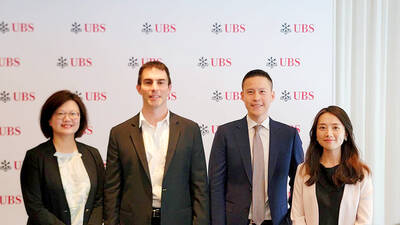ASE Technology Holding Co (日月光投控), the world’s largest IC packaging and testing services provider, held a groundbreaking ceremony yesterday for its new advanced production facility in Kaohsiung.
Construction of the K28 plant, expected to be completed in 2026, will expand ASE’s chip-on-wafer-on-substrate (CoWoS) advanced packaging capacity, the company said in a statement.
The new plant is the second phase of a plan to build two factories on a two-hectare plot in Kaohsiung’s Dashe District (大社) in response to growing demand for CoWoS advanced packaging and final testing services.

Photo courtesy of Kaohsiung Economic Development Bureau
The first phase of the plan, the K27 facility, was completed and began operations last year.
ASE and affiliate Hung Ching Development and Construction Co (宏璟建設) are collaborating on the K28 plant, with ASE providing the land and Hung Ching the capital and construction know-how, ASE Kaohsiung Plant general manager Raymond Lo (羅瑞榮) said in the statement.
The new factory, designed to have seven floors above ground and one floor underground, will be built with low-carbon building materials and equipped with energy-saving and energy-efficient equipment and solar panels, the company said.
ASE said the K28 facility, its first to have an anti-microvibration design, will represent a step forward in smart manufacturing technologies and automation.
More than 400 engineers have been assigned to focus on automation, developing software, equipment and procedures such as automated coding that will allow the factory to be much less reliant on workers.
ASE has been expanding its advanced assembly technology capacity in Kaohsiung beyond the K27 and K28 facilities.
In August, ASE said it had signed an agreement to acquire a facility coded K18 in Kaohsiung’s Nanzih District (楠梓) from Hung Ching for about NT$5.26 billion (US$163.41 million) to expand its sophisticated IC pumping packaging and flip chip packaging capacity.
Additionally, in late December last year, ASE announced it had leased buildings from ASE Test Inc in Nanzih to expand its packaging capacity. The industry believed that those moves were aimed at increasing packaging capacity for AI chips.

TECH TITAN: Pandemic-era demand for semiconductors turbocharged the nation’s GDP per capita to surpass South Korea’s, but it still remains half that of Singapore Taiwan is set to surpass South Korea this year in terms of wealth for the first time in more than two decades, marking a shift in Asia’s economic ranks made possible by the ascent of Taiwan Semiconductor Manufacturing Co (TSMC, 台積電). According to the latest forecasts released on Thursday by the central bank, Taiwan’s GDP is expected to expand 4.55 percent this year, a further upward revision from the 4.45 percent estimate made by the statistics bureau last month. The growth trajectory puts Taiwan on track to exceed South Korea’s GDP per capita — a key measure of living standards — a

Samsung Electronics Co shares jumped 4.47 percent yesterday after reports it has won approval from Nvidia Corp for the use of advanced high-bandwidth memory (HBM) chips, which marks a breakthrough for the South Korean technology leader. The stock closed at 83,500 won in Seoul, the highest since July 31 last year. Yesterday’s gain comes after local media, including the Korea Economic Daily, reported that Samsung’s 12-layer HBM3E product recently passed Nvidia’s qualification tests. That clears the components for use in the artificial intelligence (AI) accelerators essential to the training of AI models from ChatGPT to DeepSeek (深度求索), and finally allows Samsung

READY TO HELP: Should TSMC require assistance, the government would fully cooperate in helping to speed up the establishment of the Chiayi plant, an official said Taiwan Semiconductor Manufacturing Co (TSMC, 台積電) yesterday said its investment plans in Taiwan are “unchanged” amid speculation that the chipmaker might have suspended construction work on its second chip packaging plant in Chiayi County and plans to move equipment arranged for the plant to the US. The Chinese-language Economic Daily News reported earlier yesterday that TSMC had halted the construction of the chip packaging plant, which was scheduled to be completed next year and begin mass production in 2028. TSMC did not directly address whether construction of the plant had halted, but said its investment plans in Taiwan remain “unchanged.” The chipmaker started

LOOKING BRIGHT: Taiwanese tech stocks have been trading at 18 to 19 times earnings, beating the 15 percent long-term average amid AI-driven optimism, an analyst said Taiwan’s economy could expand by as much as 5 percent this year, fueled by its technology manufacturing edge amid a global artificial intelligence (AI) boom, while tariff exemptions on semiconductor products keep the country’s levy burden low despite a headline rate of 20 percent, UBS Investment Bank said yesterday. “Although Washington has imposed a 20 percent tariff on goods from Taiwan, exemptions for semiconductors keep the weighted average low,” UBS senior economist for Asia and China William Deng (鄧維慎) said. The growth momentum is expected to extend into next year, with technology companies’ revenue projected to rise 17 percent, UBS research head